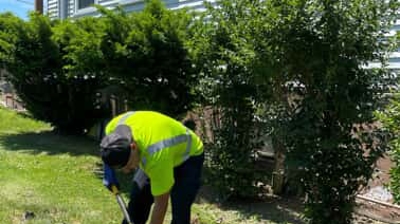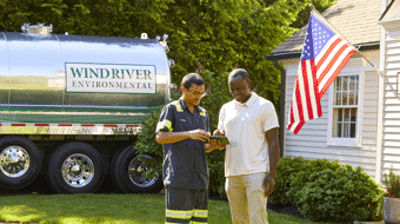Should I Get a Septic Inspection When Buying a House?
You’re finally closing in on purchasing your new home, and it seems like you’ve got the best deal on the market. But have you checked out the house’s septic system?
One of the questions we frequently hear is whether it's worth it to have a septic system inspected before purchasing a home. The answer is, absolutely! A septic inspection is crucial when buying a house with a septic system. It reveals potential problems like failing components or improper maintenance. This knowledge lets you negotiate repairs with the seller or budget for future fixes, avoiding costly surprises.
Buying a House with a Septic Tank? Follow These Steps!
Doing a thorough septic tank inspection when buying a house could save you tons of money, time, and labor in the future. Just follow these easy steps:
1. Understand How the System Works
You don’t need to be a plumbing expert to know the basics of how a septic system works—and how to know if it isn’t working.
A septic system consists of a pipe that collects all the home’s wastewater. It transfers the water underground to a watertight septic tank. In the tank, solids or sludge settle to the bottom. Scum, or floatable materials, float to the top. The layer in between the scum and sludge contains effluent, or liquid wastewater. This exits the tank into a buried drain field in your yard. This water then disperses into the soil. The septic tank’s job is to keep the sludge and scum contained until a professional comes to pump them out.
Septic tanks are pretty similar across the industry. Different sizes will need bigger drain fields and soil types for proper drainage. Most houses have conventional septic tank systems that use biological and physical processes to treat your wastewater and drain it. Advanced, newer systems will have more complex processes that might require additional maintenance and costs on your end, including yearly monitoring and reporting. Some older systems might have cesspools instead of septic systems, which you may need to pay to replace.
2. Get a History of the Home’s Septic System
Whoever you’re buying the home from should be able to give you the details of their septic tank and their last inspection.
Be sure to ask these questions:
- Has the system ever been pumped? How often did you pump it?
- Where is the septic system located near me?
- Is there a septic location map?
- This is an important document for the septic inspection. It should show the tank, leach field, and any leaching chambers.
- Ask for the history of the maintenance of the system:
- When was the last inspection?
- Several states require septic inspections within a couple of years of buying or selling a house.
- What contractor did you use?
- Do you have any maintenance records?
- Have there been any problems?
- Were they repaired?
- Where are the covers for the tank?
- Every tank should have manhole covers over the chambers and the tank, which an inspector uses to access the tank for cleaning or testing.
- How old is the system?
- A good system can last 15-40 years, the age should be on the permit.
Watch and listen closely to the seller as you ask. It’s possible they could lie to cover up issues with the system in order to save money on an inspection or repairs. If these questions or the documents reveal any problems with the system, you may be able to negotiate a lower price or repairs as part of your final price.
3. Perform a Visual Self-Inspection
Ask the homeowner if you can see for yourself where the septic tank system is during a house tour. While you may not be able to see the tank underground, you can keep an eye out for these symptoms of septic problems throughout the house and yard:
- Pipes gurgling: could indicate that the tank is full or needs pumping.
- Toilet flushing issues
- Slow drains
- Water backup: if water backs up when you run the washing machine—or if you see sewage backing up in any of the water drains— it could mean the system has failed.
- Bad odors: anything smelling like rotten eggs is likely toxic sulfur from raw sewage that has escaped the tank.
- Greener grass: any random patches in the yard much greener than the rest could be a sign of a leaking tank, as the extra fertilizer in the yard is causing the grass to grow faster. It is also good to look for any trees or plants with long roots that live near your septic system as they could potentially cause damage in the future.
- Standing water: smelly water collecting in unusual spaces or close to the drain field means the system is likely leaking and releasing hazardous wastewater into your yard.
- CandyCane: Also called a plumbing vent. This pipe resembles a candy cane, allowing proper air ventilation for the leaching field. Sometimes vent pipes can also be installed to run through the home’s main plumbing ventilation. It’s important to ensure that this pipe has no obstructions and is properly ventilating air. It is normal for it to emit a strong odor.
If any of these issues are happening, it’s likely that the septic system is in serious condition and needs immediate attention.
4. Stay Informed and Be Aware of the Costs
Once the inspection is done, ensure that you have documented proof of any and all costs that could come from fixing the septic system of the home you’re buying. While the inspector is there, ask them for quotes on the cost to repair the unit and completely replace the system.
Get both quotes in writing, no matter how inexpensive, or expensive the work would be. The inspector should also give you a septic tank inspection report with detailed analysis and pictures, especially if there are problems.
Once you have this documented information, you can use this in a negotiation to lower the price from the homeowner. If they agree to cover the costs associated with the inspections or repairs, ensure you get proof of their agreement and a legal report of what they are covering.
This way, if you have a comprehensive report, you can use it to help any septic company you hire later on to inspect or do repairs on the system.
If you’ve never owned a septic system before, they do require regular maintenance to stay in good condition. Tanks need regular pumps, which can cost between $200-$500. Repairs can be even more costly. Fortunately, if you perform good preventative maintenance on your septic system, it will save you more repair costs in the future.
5. Call the Experts
Even if none of the preceding symptoms appear at your potential new house, don’t take the word of the owners for granted. It’s always good to get a second opinion from a professional. While it may seem bothersome to pay for septic tank inspection costs now, doing so will save you much trouble down the road.
If the inspector finds anything, you’ll be glad you didn’t close on the house with a faulty system. If everything is in good shape, you’ll have peace of mind and an expert’s opinion on anything to watch for in the coming years of living in your new home.
The first step is finding a trustworthy, professional company to do the inspection right. Wind River Environmental specializes in performing septic inspections when customers are buying a home. Our team will send an expert to check for these items in your potential septic tank system:
- Pumping and maintenance records
- The system’s age
- The tank’s sludge levels and scum thickness
- Signs of leakage
- Signs of backup
- The integrity of the tank, inlet, and outlet pipes
- The drain field, for signs of system failure
- The distribution box, to ensure drain lines are receiving equal flow
- Available records so you can prove the system complies with local regulations about septic function and location
Also, be there for the inspection so you can ensure they do the job right. The homeowner may recommend an inspector to you, but it’s best to get a third party. This will ensure the owner, inspector, and real estate agent don’t collude together to give you a false report on the true nature of the system. Even if the homeowners are honest, by being in person at the inspection, it will show your commitment to the sale.
Get a Professional Septic Tank Inspection from Wind River Environmental
Closing on a house is a difficult process, but Wind River Environmental is here to make it easier. We’ll give you a professional, honest inspection of your soon-to-be home, and give you fair quotes on repair and replacement costs—which we can also do for you!
Get in touch with us today so we can schedule an inspection and give you a high-functioning septic tank system for your dream home.






